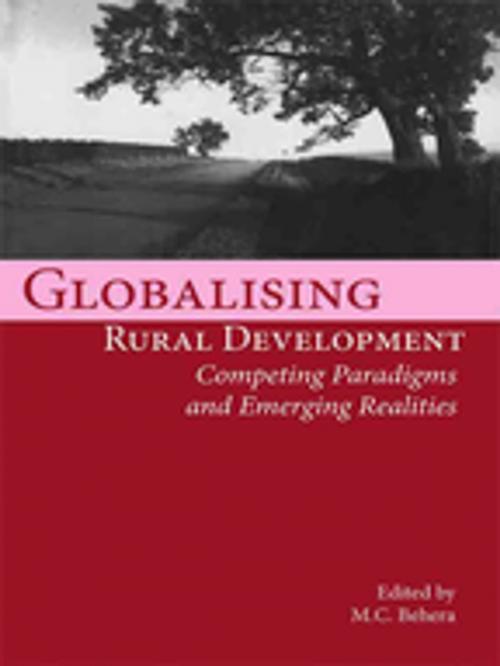Globalizing Rural Development
Competing Paradigms and Emerging Realities
Business & Finance, Economics, Economic Development, Nonfiction, Reference & Language, Reference, Social & Cultural Studies, Social Science| Author: | ISBN: | 9788132119999 | |
| Publisher: | SAGE Publications | Publication: | June 8, 2006 |
| Imprint: | Sage Publications Pvt. Ltd | Language: | English |
| Author: | |
| ISBN: | 9788132119999 |
| Publisher: | SAGE Publications |
| Publication: | June 8, 2006 |
| Imprint: | Sage Publications Pvt. Ltd |
| Language: | English |
Ever since rural development emerged as an independent field of inquiry in the 1950s, it has been subjected to many changes in emphasis and ideology. These changing perspectives have resulted in shifts in policies and programmes and have influenced the international discourse on rural development. The recently initiated process of globalisation has brought in its wake yet more rethinking on the most appropriate approach to rural development. Conceived against this background, this volume examines the impact of the changing paradigm of rural development on poverty alleviation, equity, gender, food security, employment and sustainability. The volume's major concern is: Can the goals of rural development be achieved in a globalised world?
The central argument is that the new paradigm of rural development reflects the core-periphery dichotomy, in which the core imposes on the periphery—in a top down approach—in all major interventions. As a result, maintain the contributors, the new paradigm is ridden with limitations in addressing the highly differentiated needs and contexts of rural development both in developing and developed countries.
Divided into four sections including the introduction, the volume
-examines the inherently contradictory relationship between the new development paradigm and the goals of rural development;
-studies the new role of the state and state-led interventions in the context of globalisation, and the role and potential of NGOs in rural development;
- highlights the rural livelihood framework and the impact of endogenous efforts at rural development in various European and Asian countries; and,
-presents participatory methods for addressing problems like food security, women's empowerment, and poverty alleviation.
Ever since rural development emerged as an independent field of inquiry in the 1950s, it has been subjected to many changes in emphasis and ideology. These changing perspectives have resulted in shifts in policies and programmes and have influenced the international discourse on rural development. The recently initiated process of globalisation has brought in its wake yet more rethinking on the most appropriate approach to rural development. Conceived against this background, this volume examines the impact of the changing paradigm of rural development on poverty alleviation, equity, gender, food security, employment and sustainability. The volume's major concern is: Can the goals of rural development be achieved in a globalised world?
The central argument is that the new paradigm of rural development reflects the core-periphery dichotomy, in which the core imposes on the periphery—in a top down approach—in all major interventions. As a result, maintain the contributors, the new paradigm is ridden with limitations in addressing the highly differentiated needs and contexts of rural development both in developing and developed countries.
Divided into four sections including the introduction, the volume
-examines the inherently contradictory relationship between the new development paradigm and the goals of rural development;
-studies the new role of the state and state-led interventions in the context of globalisation, and the role and potential of NGOs in rural development;
- highlights the rural livelihood framework and the impact of endogenous efforts at rural development in various European and Asian countries; and,
-presents participatory methods for addressing problems like food security, women's empowerment, and poverty alleviation.















